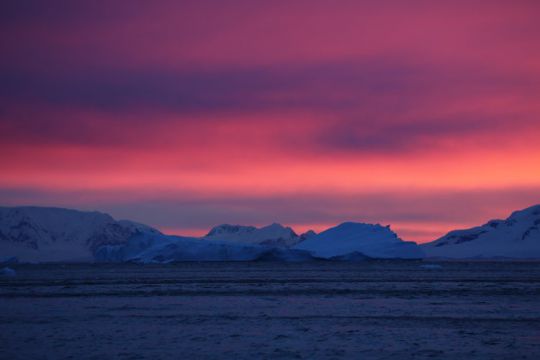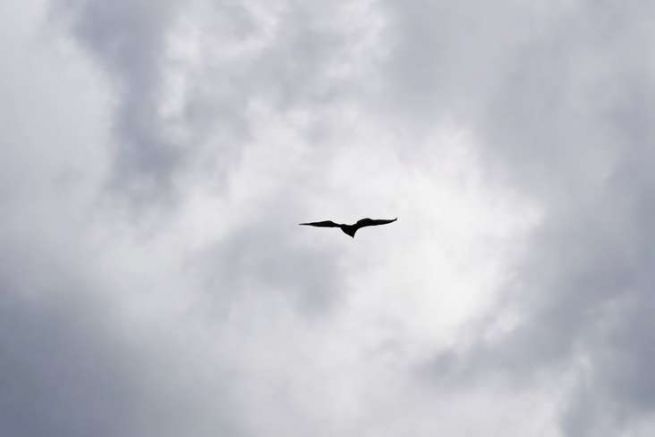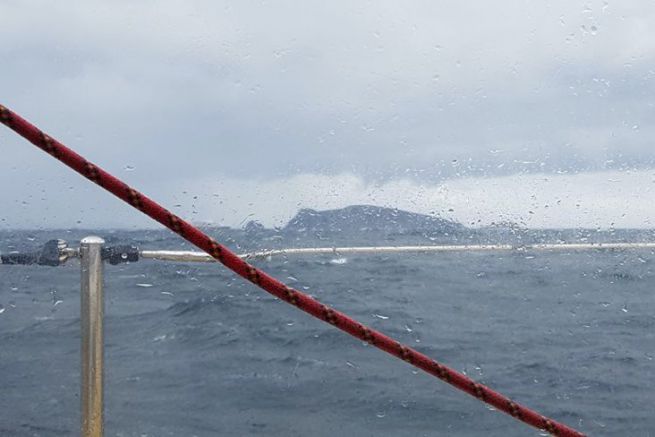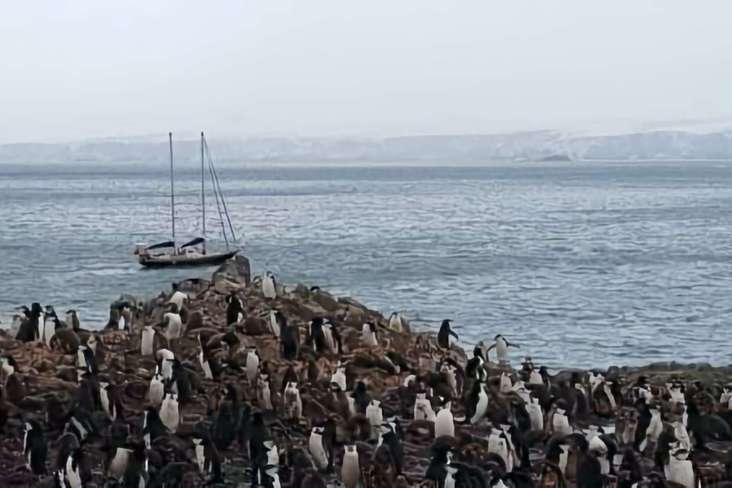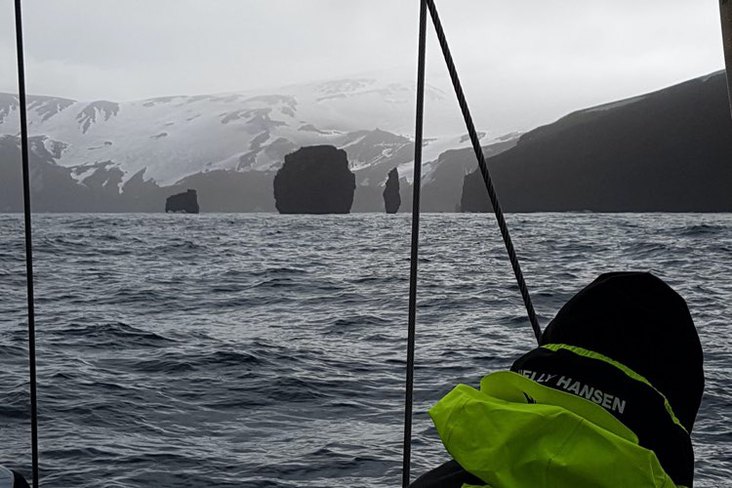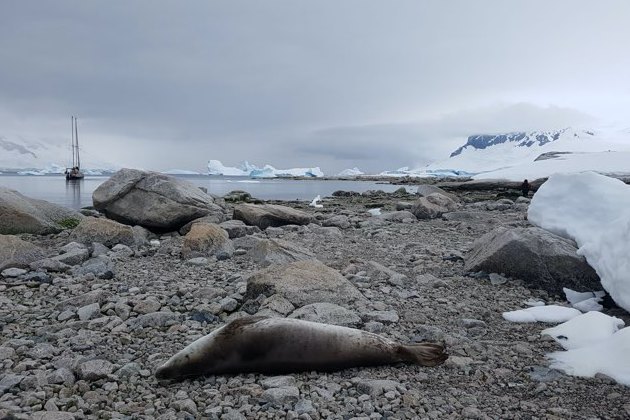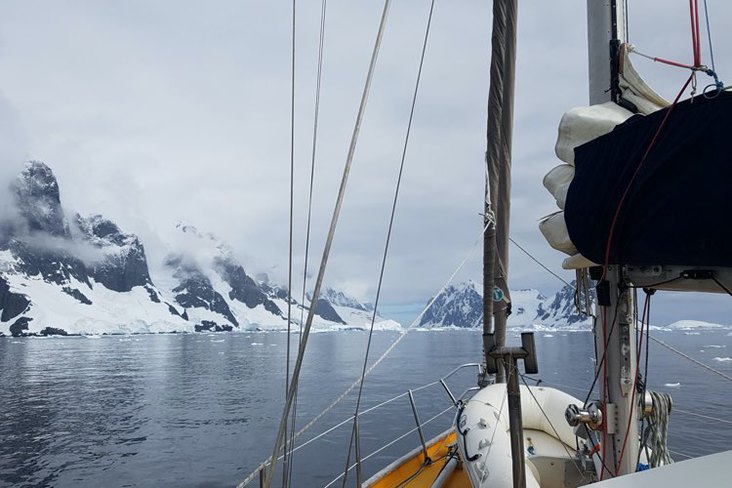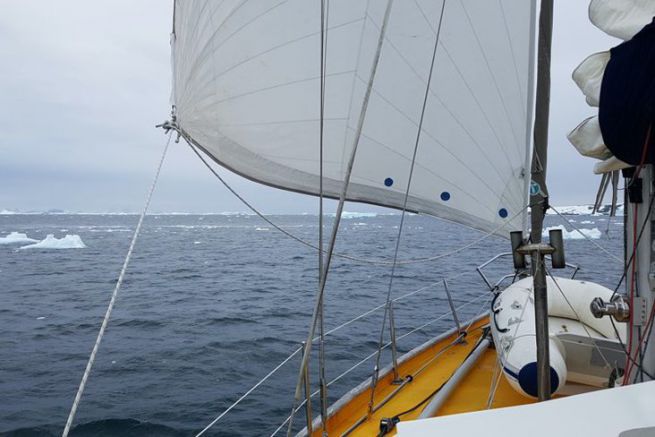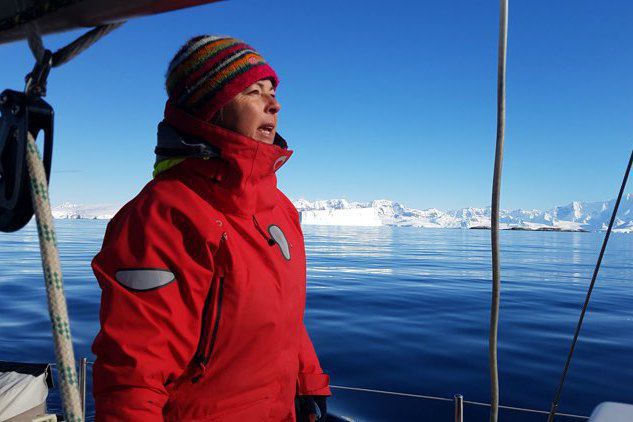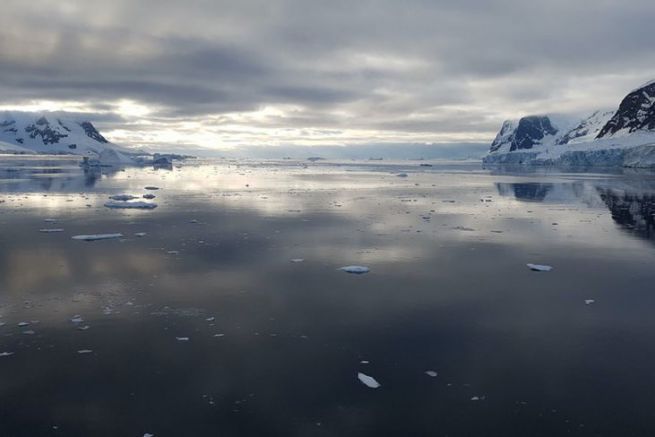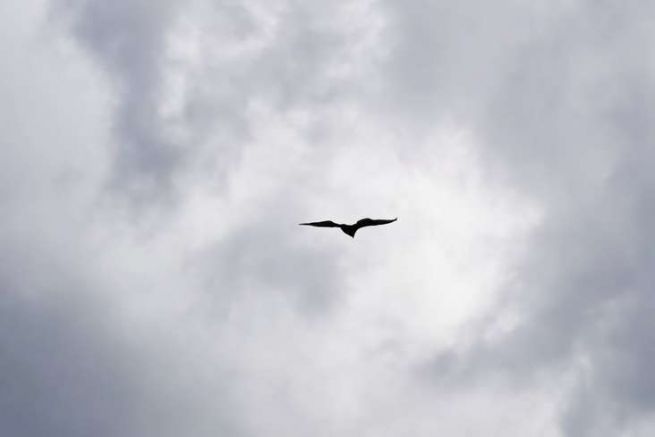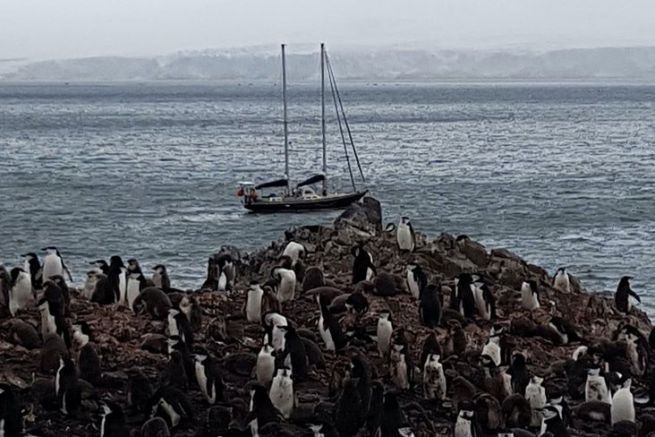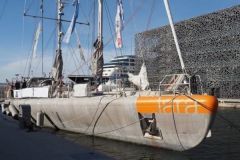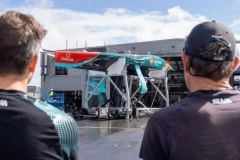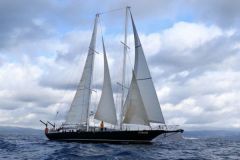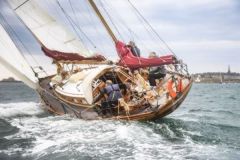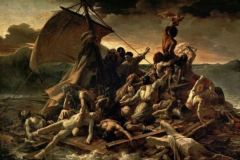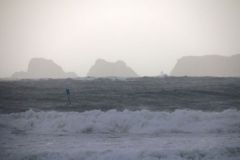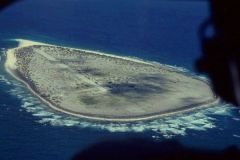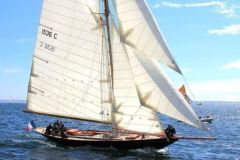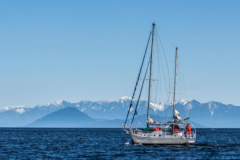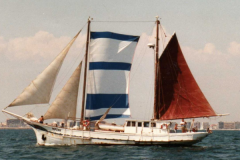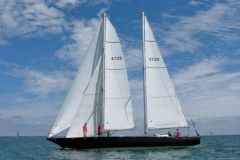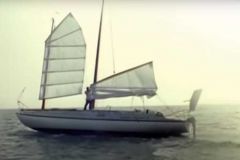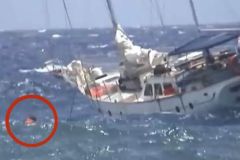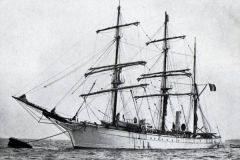Embarked on a 50-foot steel schooner for 60 days in Antarctica, Sara had a powerful experience. She brings here a complement to Dominique's story . A less nautical vision, but supported by a very precise logbook, supplied hour by hour.
You don't push your limits, you discover them...
Jean-Louis Etienne, (Persevere)
This February 23, 2019 after a rather sleepless night, I knew what I wanted and what I could do
The day before, in the middle of the Antarctic, we had been on a strong tack creating a waterway on board. I discovered that morning that I was not ready to relive what I had experienced the day before. I was on the deck of a boat that was no longer moving forward, dragged by the current towards rocks and landforms, clearly visible on the port side.
The novice that I am, at this very moment, listed the contents of my bag if the boat were to run aground on the nearby rocks, if the last chance attempt to restart the engine "salted" by Dominique failed (in the shock, the diesel was contaminated by sea water). I wonder about the survival and how we were going to invest it with 6 people. I imagine how to spend the night outside when the temperature goes down, and to look at a stranded boat
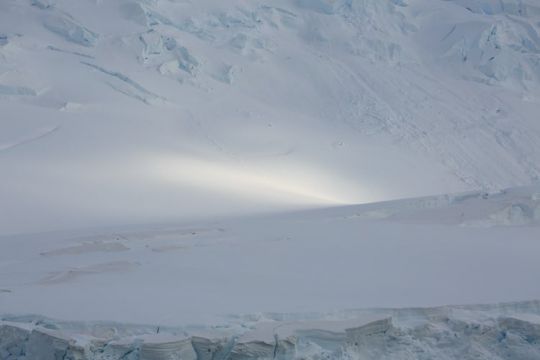
I knew that morning where my limit was: the limit of trust that I had given, quite blindly it is true, to an unknown skipper and sailors. I had given my trust, full and complete, to beautiful words, to an old man, to a former good sailor, to a former salesman too, to a man who knew how to sell me my dream and to profit from it. This could have been of no consequence.
Everyone had an interest in it, if everything had gone well, on a sufficiently prepared boat, the exchange would have been win-win. But the greatness of a man is not measured by his past, it is experienced in the present. And I did not come here, to the Antarctic Peninsula, to stay.
For the past 3 years, my work as an artist has been in dialogue with polar guides and photographers. In addition to my work as a jeweler and designer, I create metal paintings freely inspired by photographs, especially polar ones.
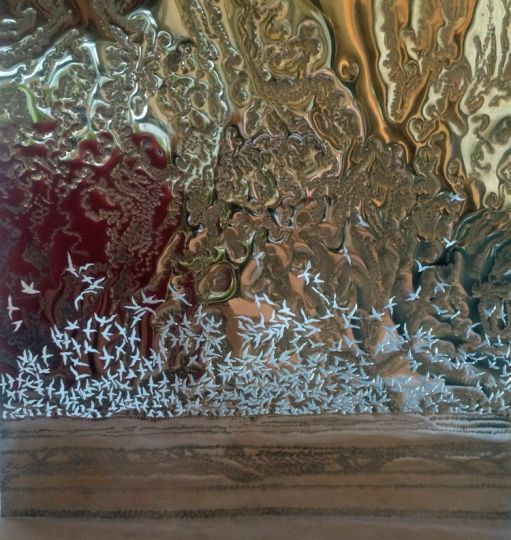
A complete and detailed account
In 2018, when the captain proposes me to participate in an expedition that "seems" serious and prepared, it seems too good to be true. I accepted and organized my family and professional life to be away for two months.
In the end, the trip will be rich and eventful, the time spent on the peninsula on the sailboat much shorter than expected (and cleverly sold). The encounters and the accidents on the way will have taught me much more than any other expedition, but I also almost didn't come back from it
I started writing the story of this trip on January 2, 2019 at the airport in Marignane. I continued through the extraordinary encounters, from Buenos Aires to Ushuaia, from the Nautico's pontoon to the Afasyn's, from the Micalvi and the heights of Puerto Williams to Deception, from Portal Point to Enterprise. Every day I listened, I observed, I noted: what I heard, what I saw, what these men and women on the boat said, and others, crossed on a pontoon or a deck of another boat. Every evening in the saloon in front of their glasses, or on the deck between two maneuvers, and for me between two photos and during each anchor watch. I wrote.
My job is one of observation and detail. I listened and I noted again. After two attempts and finally the crossing of the Drake, I will always keep the memory of that dawn that rose over our first icebergs.
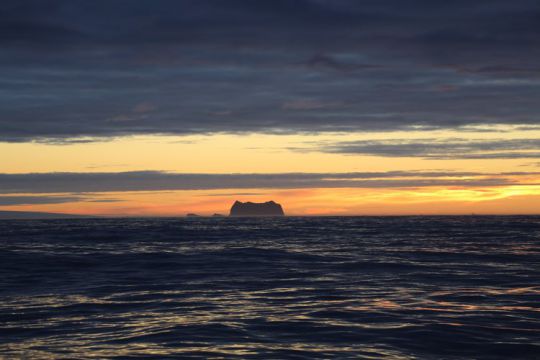
I left without knowing, with my eyes closed, to live my dream. I want to come back.
And yes, in all conscience and after careful consideration, I left the side of a ship that had a proven structural damage, the exact extent of which was impossible to measure. It was in danger of sinking, especially if the weather had not been as kind as it chose to be in the end.
This on a neglected, tired, ill-prepared, yet solid boat. A solid and cracked building remains a solid building. As long as you don't shake it too hard
A skipper who fails
I left a boat on which the skipper said: " I'll dive in and see the size of the hole in the keel. "This hole that caused 20 liters per minute to flow into the boat: " I'll go down to see ".
In water at zero degrees, without wetsuit and without visibility, at 72 years old and without the physical condition of a diver, in fact, without being a diver. And when we "dared" to talk about hypothermia (equipped with a dry suit, you can only last 20 minutes), he told us that his wife would warm him up! My confidence, which was already very low, dissolved a little more in this imaginary and impossible dive. I am a diver, but I would not have gone down without a wetsuit and without visibility.
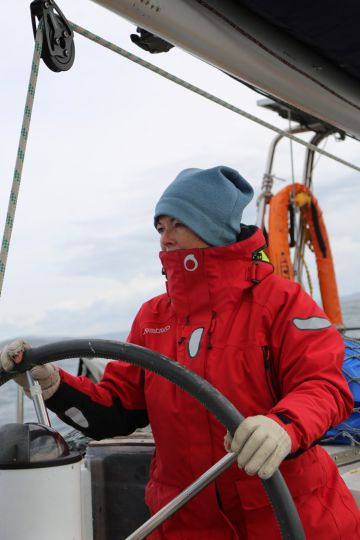
A desire to go to Antarctica stronger than anything
In a group at sea, everything is seen and revealed, I was myself, I watched, I observed and I learned a lot. From humiliation to bullying, from useless orders to muddy jokes. It didn't matter that I was the novice crew member on board, "under the influence", who didn't drink alcohol, as long as she paid and kept her mouth shut. I didn't know I was that impressionable. The quality and greatness of human beings is also measured by their capacity for tolerance. For some, difference is a strength, for others a danger, a threat, at sea as on land.
If it hadn't been for my dream, for my immense desire to go to Antarctica, for the people I had left behind who were waiting for me, for the high school class to whom I wrote every week, if it hadn't been for all that to get to Ushuaia, I wouldn't have embarked. When I realized that I was leaving with some crew members whose values I did not share, and with already more than ten days behind the announced program, I seriously considered not to take place on board.
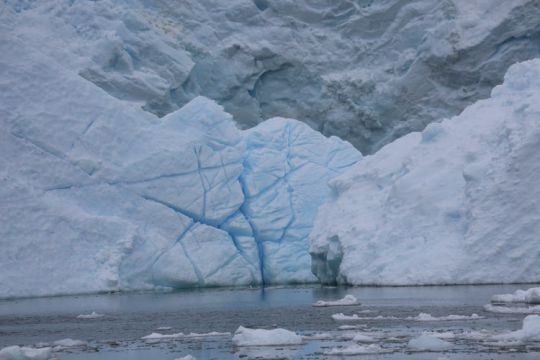
I thought, naively, that those who go to sea, whether they are pleasure sailors or even professional charters, that the respect of their environment would be obvious and acquired. And I even convinced myself that this could justify the small arrangements and the self-interest, which I sensed, but did not want to see. I thought the human being was greater, I am an incurable optimist!
I thought that there were values, and respect not only for humans, for example for the professionals who charter in this area, but also, and above all, for this magnificent and grandiose environment. I discovered that, as on land, there are those who use and throw away, this is true for people and this is true for sailors. And for the things they consume, there are those who divert and those who privilege above all their own interest(s).
I met a lot of people on the pontoons and at the moorings, I talked to everyone and wrote a lot every day.
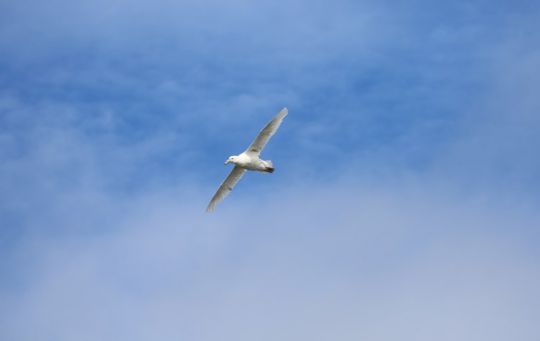
Memorable encounters
I salute here the memory of Sophie Bely and Arnaud Dhallenne, who disappeared at sea, off the Falkland Islands on the Paradise on March 5, just a few days after our return to Ushuaia. Sophie's welcome aboard Kotick, whom we met before our departure for Antarctica, remains one of the most human moments of this long journey, a dialogue between two women who confide in each other, without hiding anything, as true encounters allow. Her words and her story are among my most precious notes.
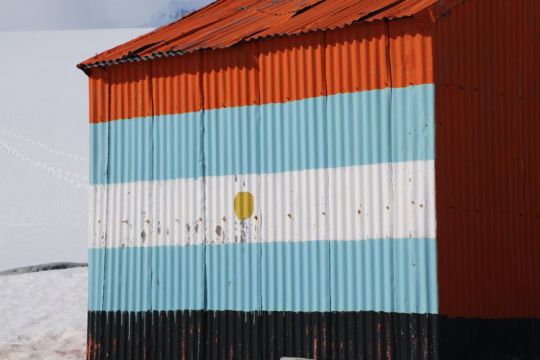
I also salute the solo sailor, crossed in Vernadsky, between two blocks of ice and a few moorings, who offered me a rare moment on a healthy, efficient and maintained boat, and moreover warm: after several weeks at sea it was an incredibly beautiful discovery. And it showed me in a concrete and brutal way the multiple defects and failures of a part of the crew and of the boat I was on.
The reception that evening by part of my crew was colder than the ice all around us: I had dared to talk about our engine problems? I had dared to break the omerta. The answer was clear: our engine is fine, and why go and report some small difficulties already solved outside, and risk tainting the image (or the ego?) of a captain and his crew?
The same captain was however requesting translation (he does not speak English) when he wished the next day to ask for help and spare parts to the technicians of the base, but those perhaps were less likely to repeat it, Ukrainians that they were?
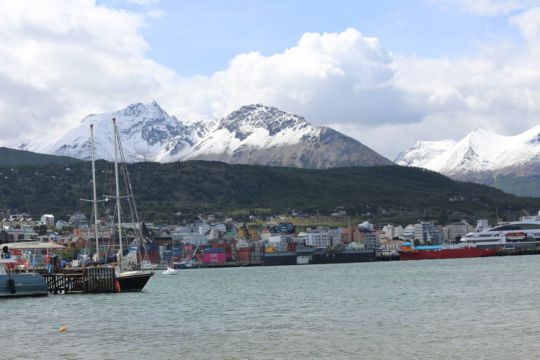
A variable geometry regulation
Realizing afterwards that our life jackets were not functional, after several weeks on board, was a first shock. However, I still had a little confidence in the boat and its skipper. From the boat, I regularly corresponded with a sailor friend. All the sailors I told about my journey even after my return confirmed it to me: leaving the boat was the wisest solution, because it was the only one that ensured my return alive.
The skipper's choice to repatriate his boat is respectable. Everyone is free to put his life at stake: his own, not that of others.
It's easy to do chartering under the guise of an association. To obtain the TAAF permit, it is enough to embellish and embroider a nautical CV of sailors, some of whom have little or no experience, because there is no verification. Even a novice understands quite quickly how to fill in the boxes to obtain the permit.
Nothing is black or white, I do not pass judgment, but I want to testify to the facts and I intend to publish the story of this trip in a comprehensive way (in the form of a book) without omitting any extraordinary moments.
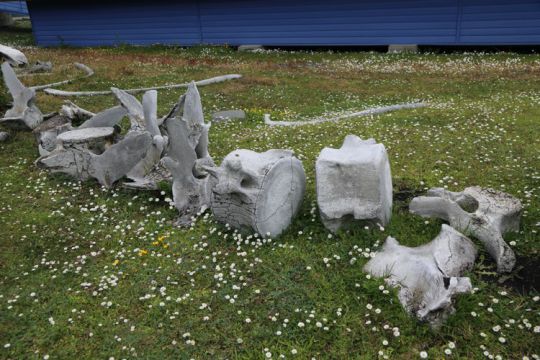
Excerpt from the email summarizing the proposal made to me and which I accepted in July 2018
euros
The journey is carried out in the following way:
Regrouping on Ushuaia for the arrivals, plane on January 4, 2019, races then Puerto Williams complement of race and the 8: standby for the Drake 500M
Return planned around March 4th in Tierra del Fuego so plane-return around the 9th to be cool.
We spend 60 days in La Cardinale happy to welcome you.
The budget for this cruise is 80 euros per day per person which covers food, including wine of course, diesel, boat insurance, port fees inherent to the movement of the boat, etc."
euros
"The insurance of the boat"? After the grounding, the captain will admit to us that he is not insured for these regions of the world...
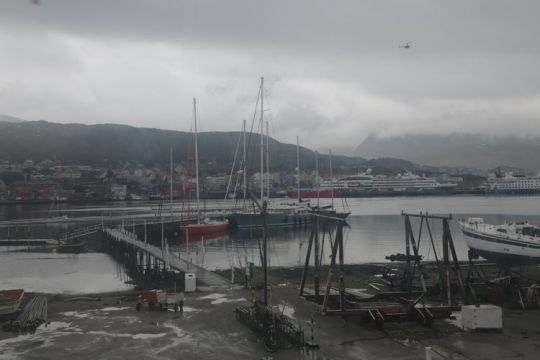
A sailboat not ready
I arrived on January 3, 2019 on a boat that was under construction, dirty and clearly not ready. There was a pump problem, and the crewman and captain spent the next few days tinkering while I paced the city streets and surrounding hills.
euros Puerto Wlliams, several days are lost trying to install a sonar on the hull. This requires to make the boat enter a dock of the fishing port. But finally the dock is too narrow and will not allow to take the boat out. We will leave without this sonar. The radar on the top of the mast being definitely out of order, this sonar might have been useful?
Finally, we will leave Ushuaia on January 8th, and Puerto Williams on January 14th, to turn back in an impassable Drake with a headwind and to take refuge in Lennox, the 2nd departure will be only on January 19th, to arrive in the peninsula on the 23rd. Already 20 days after my arrival in Terre de Feueuros
No ecological awareness
One month later, after multiple breakdowns and various and recurrent technical problems, it is a waterway which will put an end to a navigation already largely impacted and slowed down by all the maintenance problems. I will have spent exactly 30 days not sharing alcohol on this boat (I don't drink).
Contrary to what has been announced, and to what has been requested by the TAAF, the ship's black water tank is not in service, so everything is discharged into the sea. As here for example, at the anchorage of the Micalvi, the estuary with its abundant and wonderful fauna is polluted.
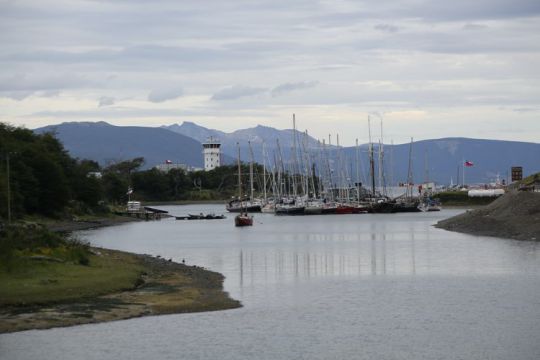
The cleaning products bought in Ushuaia are highly corrosive, toxic and polluting. How can we throw such toxic products into the sea water? While we pump this same sea water for cooking and washing dishes? And that we share this water with other boats, not to mention the fauna and flora? The incredibly clear water in the Antarctic Peninsula is already polluted by all these discharges.
As I heard on board: " ah, nobody sees us, and it's easier! ", " And me, at my age, I don't care about the environment "
No approaching animals
Penguins are curious, especially the juveniles, they are also shy, and sometimes very confident. They can be approached, slowly, at about one meter. They warn those who try to get closer by moving their head up and down and from right to left, and by shouting. They usually avoid contact with humans spontaneously.
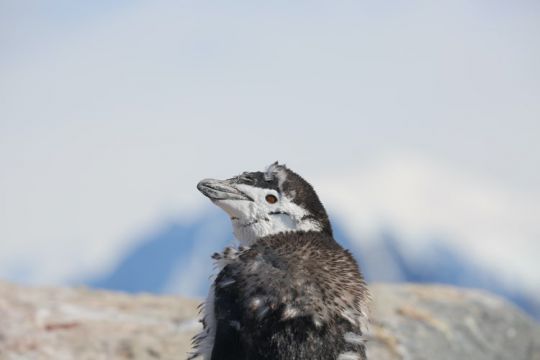
The TAAF ask to respect a distance of 5 m, and it is not always possible because they are so numerous. But avoiding them remains important, no one knows what bacteriological or infectious risk they can pose to a colony of several thousand individuals.
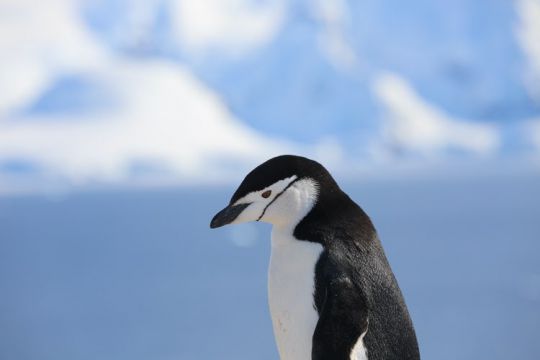
On Useful Island, we meet juvenile penguins. The captain's wife: " I wanted this feeling under my fingers, last year I did not dare, and this is probably the last time I come ".
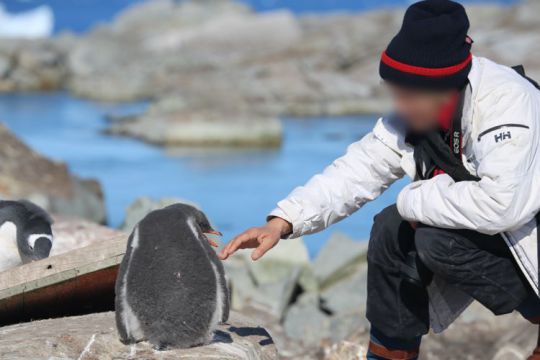
The grounding in detail
To give food for thought to those who would consider embarking one day, whatever their choice of embarkation, I quote here some excerpts from the diary, which I kept every day.
On January 22, leaving the anchorage of False Island, the captain has been up since 6 am. He is at the helm. Carole is next to him and they are verbally arguing. It is 11:15 am.
Carole : " There is a rock here, there is a high bottom, the water should break on it. "
Captain: " But no, it is there, on the left, behind us this rock! "
Carole announces aloud the numbers on the sounder: " 20 meters, 12 meterseuros "BOOM
How to describe the sound of this boat going up on the rock?
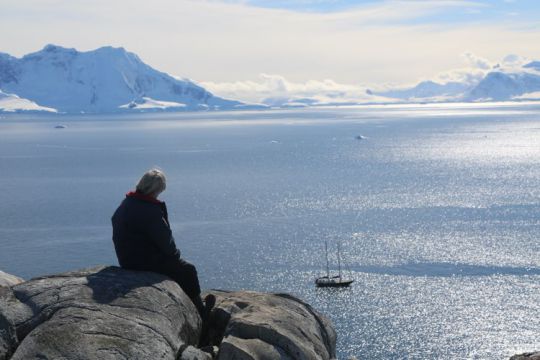
In 1/10th of a second everything changed
My hand is resting on the bar of the hood. I listen to the conversation behind my back with a distracted ear. The man at the helm is sure of himself and the worried woman next to him. I listen without listening to their tense exchange.
With the impact, everything changed: my body described a 180° arc from left to right. By reflex, my hand barely holds on to the vertical post of the hood. We hit hard. The boat is very lean, lying down, and you can feel it ready to lose its balance. I can see the clear bottom and the rocks through the water very clearly. The heel is greater than the one we had in the Drake, when the waves were breaking
The captain at the helm turns his metal wheel, hard, he gives a big push to the right. We hit again, the boat lies on the other side and scrapes the bottom. Then the boat agrees to straighten up, and finally frees itself from the rock. The return to the horizontal has never been so welcome.
The spirit then understands what it should have seen, grasped: the flat water, as when the whale is sounding, the water, too calm, which formed a large circle, and the vein of the current which ran just behind.
A crewman pops up on deck "Shit, shit. What's going on?" Dominique was thrown across the cabin. The captain's wife is white.
On board, it's a mixture of relief and shock, while the boat continues to motor on a calm sea, everyone tries to understand the unthinkable.
Engine failure!
at 11:30 a.m., i.e. 1/4 hour after the shock, the captain and his wife were busy emptying the holds to check for water ingress. Carole is at the helm and navigating: " It smokes, what do I do? "And before an answer comes, the engine coughs and stops, in a white smoke.
On opening the door of the engine room, the captain discovered that diesel oil was rising inside, through the vent of the diesel tank. And then there was the search for the pinochle, the second water supply through the diesel return circuit, the recovery of the empty cans at the bow, filling them with the contaminated diesel, piling them up on the deck... 13 cans will be filled in a quarter of an hour!
Fortunately the sea is very calm and the weather is sunny. A boat passes in the distance, clearly visible. Dominique calls Pan Pan on the VHF. Silence. It moves away and disappears. We are invisible on the AIS and our VHF is only 1 mile away. This was confirmed by Brice from the sailboat Podorange. So we are also mute.
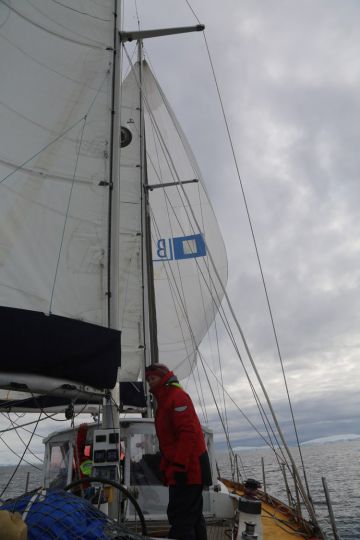
Under spinnaker without wind
In the distance, a group of whales is playing. Under mainsail, foresail and spinnaker, the boat is struggling to move forward. The 8 miles that separate us from the Melchior archipelago seem immense under this weakening wind.
The foresail is reefed, then lowered. We move forward so slowly. Until the wind drops completely and we stow that spinnaker. There is not a breath of air left. The boat is drifting.
So I learned how to stow a spinnaker.
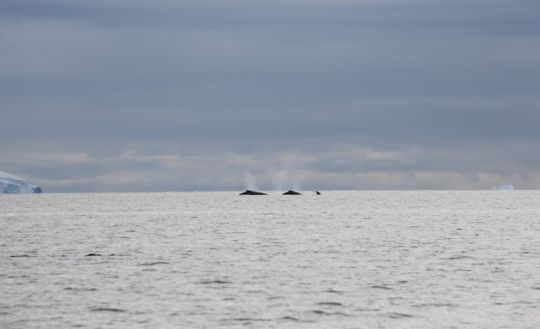
My last pictures on board ?
Carole is at the navigation, still between shock and anger. An hour passes slowly, time stretches. The whales present this morning on the horizon, came closer to the sailboat, and finally come to accompany us for a moment.
Despite the tense atmosphere, I take out my camera. To hell with the critics, we don't know if we will get out of this alive! I wonder if these will not be my last photos on board?
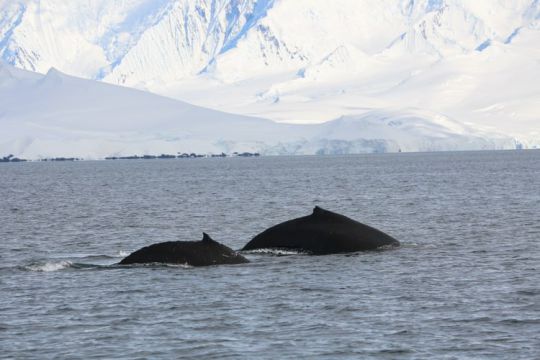
The whales come really close to the boat and surround us, a moment that would be magical, but on board, apart from a few "oh's", nobody is really interested in the whales. I linger at the back for a long time, watching them play curious and follow us.
16h30. The base of Melchior takes shape, with its closed shutters. We do not know yet that it is closed. The engine will eventually start again and we reach an anchorage away from the closed base.
The captain asked us not to talk about the damage to the hull, but only about the water in the diesel. " I would like to say that we have water in the diesel, and that's it, cause unknown. That's all we know. ", " And the cause? " asks Carole, " is it the Holy Spirit who has salted the diesel with sea water surreptitiously? ", " Well, we don't know " replies the captain.
If the captain writes emails to the few sailboats still in the area and only talks about contaminated diesel, nobody knows our real situation, which makes it impossible to hijack a boat to get help, or even to be recovered.
I'm starting to consider going ashore, not crossing the Drake with this damaged sailboat. I don't think I want to have this new experience. That of a boat that in a gale can sink or split in two. That of an evacuation in the middle of the sea, in the Drake, with a faulty AIS and a VHF that carries at 1 mile. It seems that my desire for new experiences has reached its limit
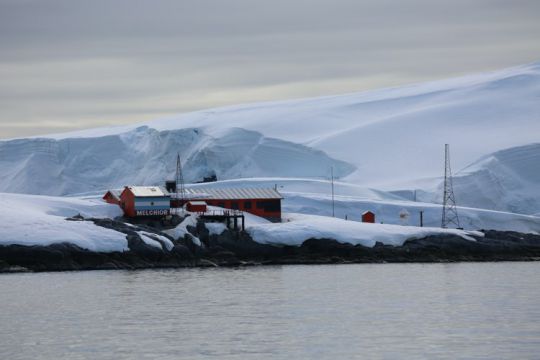
Surreal atmosphere on the morning of January 23
Nevertheless, this morning of January 23rd, the captain's occupation consists in drying with a heat gun the diesel filter which has been affected by salt water. This famous new filter that we had ordered and waited for, and that was relentlessly neutralized by the sea water. The generator is running and the square is smoked by the diesel fumes. Obviously this man is scattering and scattering. The night was white for all.
Dominique then addresses the captain: " You smoke the boat, and you consume our last liters of clean diesel that we should save. "
Dominique, still addressing the captain: " You have to make a call or a mayday, if you don't want to do it, I'll do it with my Iridium. "
Response from the individual: " You do what you want. "
On the bridge someone shouts: " Outside, there is a Zodiac! "
A time passes: " We need someone on deck to watch for him in case he passes by again! "
And soon after: " There is another one! "
And so we explain to Stefano the situation and ask for an evacuation, which will be provided by the crew of the MS Ocean Atlantic.
The latter offered our sailboat 460 liters of diesel, and graciously took away the 13 cans of diesel contaminated with sea water. The captain asked if they didn't have a large jerry can, so as not to stir up the cans. It's true that replacing the 20-liter can that now feeds the engine at sea, will not be easy if there is a blow of bad weather.
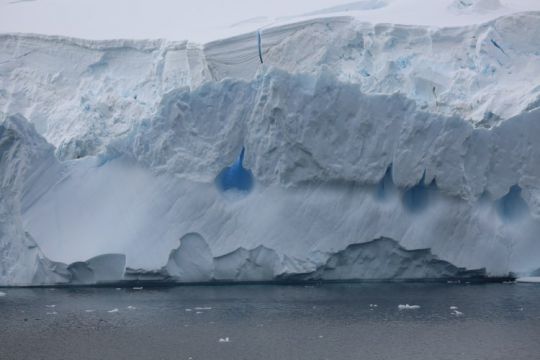
I am not a sailor. I prefer to be alive.
I, a novice crew member that the other crew members were careful not to train in the essential safety maneuvers (no safety briefing was given despite my requests), would have been quite useless for this return crossing with a reduced crew. For my part, I learned from the mountaineers that the good mountaineer is the one who gives up and doesn't reach the summit, to come back alive. And to come back to the foot of the summit another time. I had nothing to prove, I am not a sailor. I prefer to be alive, and come back on another boat.
In normal or rough weather, I become useless because of seasickness. In calm, flat weather, the only weather that allowed me to return without damage, I was still pretty useless. This is the weather they had, the sky having chosen to be merciful and I thank it.
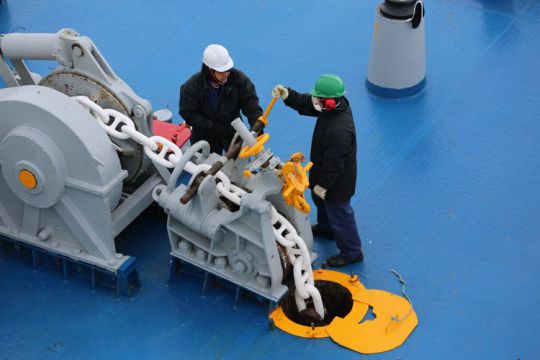
Solidarity of the seafarers
I would never have imagined that I would be able to see the peninsula from the deck of a cruise ship like the MS Ocean Atlantic. At the opposite of my desires, I was forced to recognize the professionalism of the crews. On board our sailboat, the polar guide Stefano quickly understands the situation and brings an immediate and adapted answer. The first mate and the captain, and then the whole crew showed us, if needed, despite the complications that it created for them, that the solidarity of the people of the sea is real and that we can count on it.
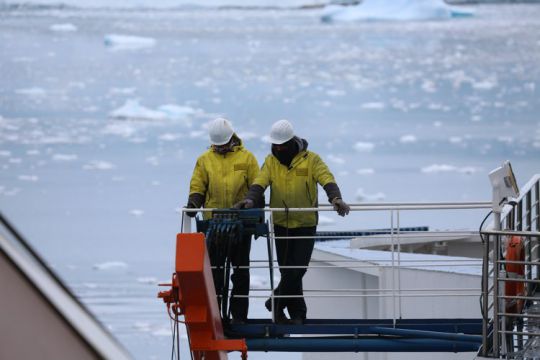
The MS Ocean Atlantic was fully booked and technically should not have taken on any additional passengers. Nevertheless, they accepted to evacuate us. Their captain also chose to offer the yacht 460 liters of diesel fuel, and got rid of its 13 cans of seawater contaminated diesel fuel. They also offered medical and psychological assistance, and finally resumed their journey, with 3 passengers.
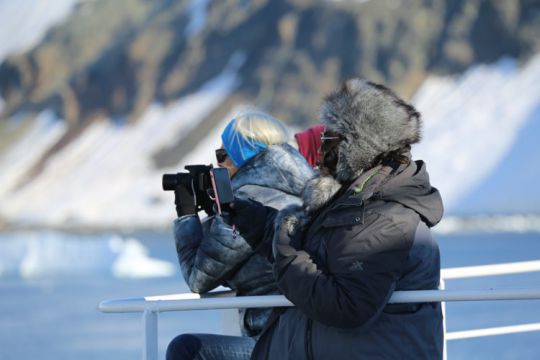
The commander took it upon himself to issue an alert, to the attention of all the vessels in the area, to indicate the position of the sailboat, indicating that this sailboat having suffered structural damage was nevertheless going to try to reach Ushuaia. So that the few ships still present or ready to cross are alerted and vigilant in case of call or new damage.
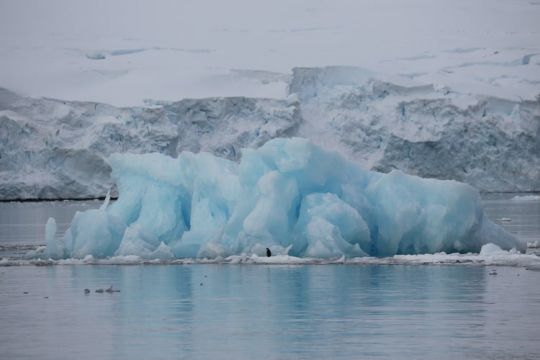
A nature in danger
In March 2019, and still today, the scientists of the BAS (British Antartic Survey) encourage me to write the story of this expedition. I want to talk about the great work they do on board some of the cruise ships, to protect the animal colonies, and to make sure they don't leave anything behind, only wonderful memories.
I can attest today that they leave nothing behind them, except pollution from engines and fuels, unlike some sailing boats that one would have imagined "clean" which do not hesitate to reject at sea toxic products and various wastes, or to touch the fauna, creating a risk for a whole colony, to satisfy the envy of one.
I was amazed to see how lightly some crews and sailboats treated the possible impacts of our landings on the fauna and the environment.
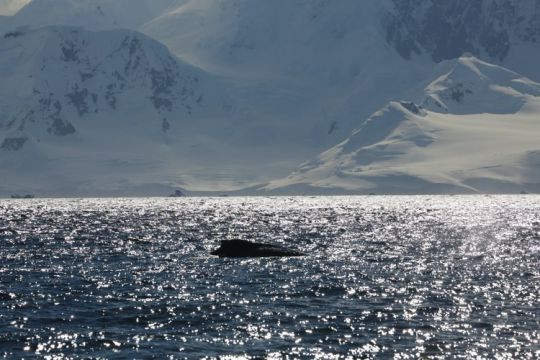
Should we hope for a tightening of the protection measures of a fragile environment already largely altered by tourism? Should we consider a maximum number of sailboats and operators authorized to access this fragile environment, already largely impacted by pollution and climate change?
Supporting the creation of a marine protected area in Antarctica, which has been requested since 2018, seems vital and urgent. It would allow us to broaden and strengthen the regulations aimed at protecting the environment. For healthy oceans and a healthy planet, scientists recommend the establishment by 2030 of a network of marine protected areas covering at least 30% of the surface of our oceans. Today, only 1-3% of the oceans are protected.
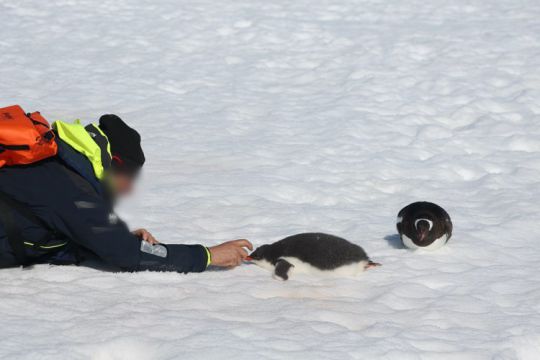
The creation of the world's largest sanctuary in the Antarctic Ocean would be a decisive first step towards this goal and an encouraging sign towards the international treaty on the high seas. We just have to take the plunge!
Is it necessary to let however the passionate persons and the lovers of these extreme regions be the ambassadors and the representatives of it? How to protect the last treasures of a planet devastated by man from man?
